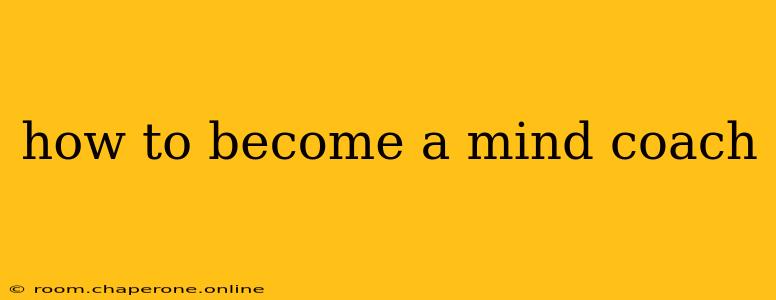Becoming a successful mind coach requires more than just a passion for helping others; it demands dedication, training, and a genuine commitment to personal and professional growth. This comprehensive guide outlines the essential steps to embark on this rewarding journey.
Understanding the Role of a Mind Coach
Before diving into the "how," let's clarify the "what." A mind coach isn't a therapist or counselor; they work with clients to enhance mental performance, boost emotional intelligence, and cultivate a growth mindset. This often involves techniques like goal setting, mindfulness practices, stress management strategies, and cognitive behavioral techniques. They help individuals unlock their potential by improving focus, self-belief, and resilience.
Step-by-Step Guide to Becoming a Mind Coach
1. Self-Reflection and Skill Assessment:
Begin by honestly assessing your own strengths and weaknesses. Do you possess strong communication and interpersonal skills? Are you empathetic and patient? Do you have experience in self-development practices? Self-awareness is crucial for effective coaching. Identifying your strengths will form the foundation of your coaching style, while acknowledging your weaknesses allows you to focus on areas needing further development.
2. Acquire Relevant Education and Training:
While there isn't a single, universally mandated certification, investing in quality training is vital for credibility and competence. Consider these options:
- Coaching Certifications: Numerous organizations offer coaching certifications, some specializing in mind coaching or related fields like life coaching or performance coaching. Look for programs accredited by reputable bodies. Research programs thoroughly, paying attention to curriculum, instructor credentials, and the program's overall reputation.
- Psychology Courses: Understanding fundamental psychological principles will significantly enhance your coaching skills. Consider introductory psychology courses or workshops focusing on areas like cognitive behavioral therapy (CBT), positive psychology, and emotional intelligence.
- Mindfulness Training: Many mind coaching techniques incorporate mindfulness practices. Formal mindfulness training, such as mindfulness-based stress reduction (MBSR) or mindfulness-based cognitive therapy (MBCT), can significantly benefit your practice.
3. Develop Core Coaching Skills:
Effective mind coaching relies on a diverse skillset:
- Active Listening: Truly hearing and understanding your clients' perspectives is paramount.
- Powerful Questioning: Guiding clients to self-discovery through insightful questioning is a core coaching skill.
- Empathy and Compassion: Building rapport and trust necessitates genuine empathy and compassion.
- Goal Setting and Accountability: Helping clients establish clear goals and strategies for achieving them.
- Stress Management Techniques: Equipping clients with tools to manage stress effectively.
- Building Resilience: Coaching clients to bounce back from setbacks and cultivate mental toughness.
4. Gain Practical Experience:
Theory is only half the battle; practical experience is vital. Consider these options:
- Volunteer Coaching: Offer your services pro bono to gain experience and build your portfolio.
- Mentorship: Seek mentorship from an experienced coach to receive guidance and feedback.
- Shadowing: Observe experienced coaches in action to learn from their techniques and approaches.
- Practice Sessions: Conduct practice coaching sessions with friends or family to hone your skills.
5. Build Your Professional Brand:
Creating a strong professional brand is essential for attracting clients.
- Develop a Website: A professional website showcasing your services and expertise is crucial.
- Network: Attend industry events, join professional organizations, and network with potential clients and colleagues.
- Marketing: Utilize social media and other marketing strategies to reach your target audience.
6. Continuous Learning and Professional Development:
The field of mind coaching is constantly evolving. Commit to ongoing learning by attending workshops, conferences, and pursuing further certifications to stay updated with the latest research and best practices.
Ethical Considerations
Upholding ethical standards is crucial. Maintain client confidentiality, set clear boundaries, and always act with integrity. If you're unsure about any ethical dilemma, consult with a mentor or seek professional guidance.
Becoming a successful mind coach is a journey that requires dedication, commitment, and continuous learning. By following these steps and staying true to your passion for helping others, you can build a fulfilling and impactful career.

